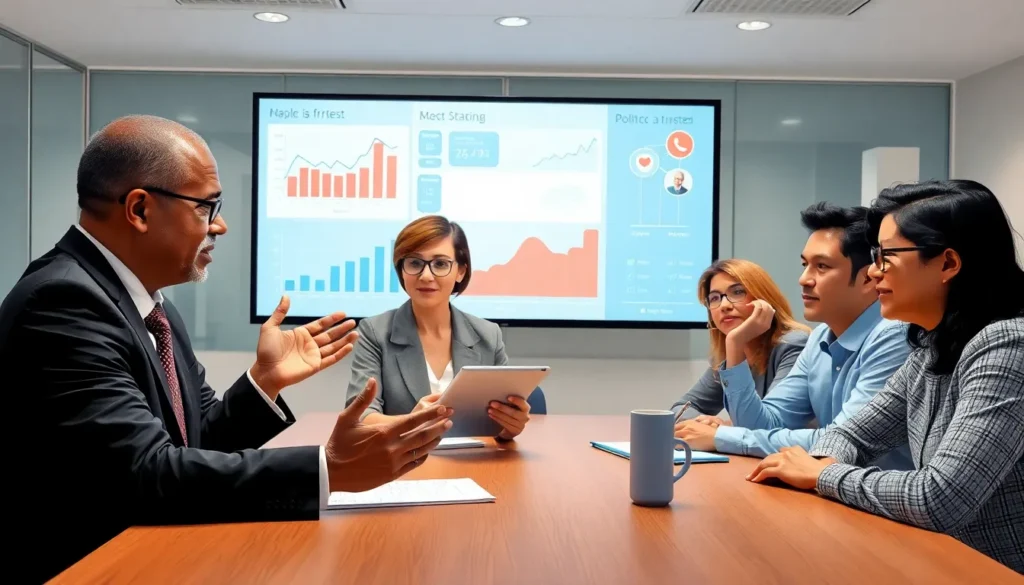In the bustling arena of politics, tools are more than just gadgets; they’re the secret weapons that can make or break a campaign. From social media platforms to polling data, these tools are the unsung heroes behind every successful political strategy. Imagine trying to fix a leaky faucet with a spoon—it’s just not going to work!
Political tools are the wrenches, hammers, and screwdrivers of the political world, helping candidates shape their messages and connect with voters. Whether it’s crafting the perfect tweet or analyzing voter demographics, these instruments can turn the tide in any election. So, buckle up as we dive into the fascinating world of political tools and discover what makes them tick. Who knew politics could be this much fun?
Table of Contents
ToggleUnderstanding Political Tools
Political tools encompass various strategies and instruments vital for influencing public opinion and guiding political campaigns. Their usage is essential in shaping effective outreach efforts and maximizing voter engagement.
Definition and Importance
Political tools are methods and resources politicians and campaign teams utilize to communicate, campaign, and connect with voters. These tools play a significant role in assessing public sentiment, targeting audiences, and crafting messages that resonate. Understanding their importance can lead to strategic advantages in elections. Successful political campaigns often depend on their effective use, which helps candidates maintain relevance and visibility within the political landscape.
Types of Political Tools
Numerous political tools exist, each serving a distinct purpose.
- Social Media Platforms: Social media channels enable real-time communication and interaction with constituents.
- Polling Data: Polling data offers insights into voter preferences and trends, guiding campaign decisions.
- Advertising Channels: Advertising channels, including television and digital platforms, help raise awareness about candidates and issues.
- Community Engagement: Community engagement initiatives foster direct connections with voters, enhancing trust and support.
- Build Coalitions: Coalition-building strategies strengthen alliances with interest groups, expanding voter reach.
Utilizing this mix of tools effectively can enhance a campaign’s overall impact and ensure that candidates address the needs and desires of their electorate.
Types of Political Tools

Political tools encompass various methods and resources critical for effective political strategies. Understanding these tools helps maximize voter engagement and campaign success.
Legislative Tools
Legislative tools consist of resources used within the law-making process. These include bills, resolutions, and amendments. Using bills allows politicians to propose new laws or changes to existing ones. Resolutions can express positions or opinions on important issues without creating law. Amendments provide a way to modify proposed legislation, reflecting changing priorities. Strong legislative tools enable effective advocacy and policy changes.
Executive Tools
Executive tools involve the powers and resources available to government executives. These tools include executive orders, proclamations, and executive budgets. Through executive orders, leaders can implement policy changes without legislative approval. Proclamations can draw attention to specific issues or events, prompting public action. Executive budgets outline funding priorities, shaping government spending and initiatives. Utilizing these tools efficiently enhances governance and public administration.
Judicial Tools
Judicial tools represent mechanisms within the legal system. These encompass court decisions, legal precedents, and judicial rulings. Court decisions can set significant legal standards or clarify laws. Legal precedents guide future cases, influencing courtroom outcomes. Judicial rulings often address constitutional questions, safeguarding rights and liberties. Strategically leveraging judicial tools reinforces legal frameworks and public trust in the justice system.
The Role of Political Tools in Governance
Political tools play a vital role in effective governance, enabling leaders to implement policies and engage with the public. Various tools shape decisions and practices within political systems.
Policy Implementation
Legislative tools allow for the introduction of bills, resolutions, and amendments that facilitate the law-making process. Executive tools encompass executive orders and budget allocations, allowing leaders to prioritize governmental actions. Courts utilize judicial tools like decisions and precedents to uphold laws, ensuring consistent legal interpretation. Through this structured approach, governments can adapt to citizen needs while maintaining governance stability. Effective use of these tools encourages transparency and accountability in the implementation of public policies.
Public Engagement
Social media serves as a powerful platform for engaging with the public, enabling real-time communication between leaders and constituents. Town hall meetings provide an opportunity for direct dialogue, allowing citizens to voice their concerns and ask questions. Additionally, community outreach initiatives foster relationships between elected officials and their voter base, enhancing trust and responsiveness. By leveraging targeted messages, political tools can resonate deeply with specific audiences, ensuring that public engagement is both meaningful and effective. Strategic outreach helps bridge the gap between government actions and public expectations.
Challenges of Using Political Tools
Challenges arise in effectively utilizing political tools. Ethical concerns often complicate campaign strategies and governance.
Ethical Considerations
Transparency remains crucial when using political tools. Misleading information can erode public trust and damage reputations. Politicians should prioritize honesty in messaging to maintain credibility. Manipulating data for favorable narratives can lead to significant backlash from voters. Campaign teams must navigate ethical dilemmas carefully, balancing persuasive tactics with truthful communication. Ultimately, responsible use of political tools fosters trust and strengthens democratic processes.
Effectiveness and Limitations
Effectiveness varies significantly among different political tools. Social media can engage millions quickly, yet platforms also face saturation and misinformation issues. Polling data offers insights into voter preferences but may not capture emerging trends accurately. Advertising channels increase visibility, although they often drown in noise from competing messages. Community engagement initiatives build relationships but require time and genuine effort to yield substantial results. Understanding these limitations enables politicians to adapt strategies and optimize their approach to address voter needs.
Political tools play an indispensable role in shaping the landscape of modern governance and campaigning. Their effective use can amplify a candidate’s message and foster meaningful connections with constituents. As political dynamics continue to evolve, understanding and leveraging these tools becomes increasingly vital.
Navigating the complexities of ethical considerations and public perception remains essential for politicians. By prioritizing transparency and honesty, leaders can build trust and credibility with the electorate. Ultimately, the responsible application of political tools not only enhances campaign success but also strengthens democratic engagement, ensuring that the voices of the people are heard and valued.





